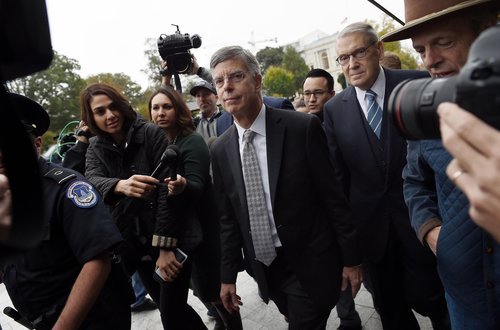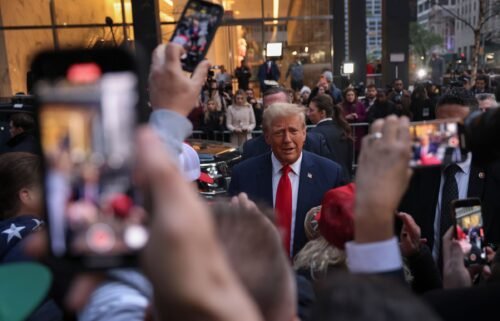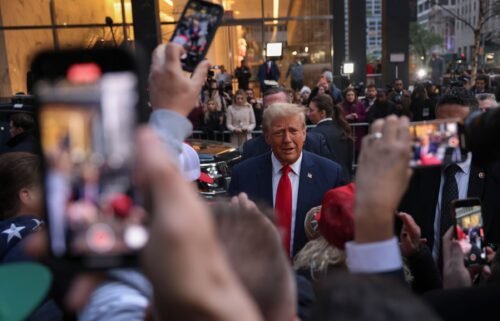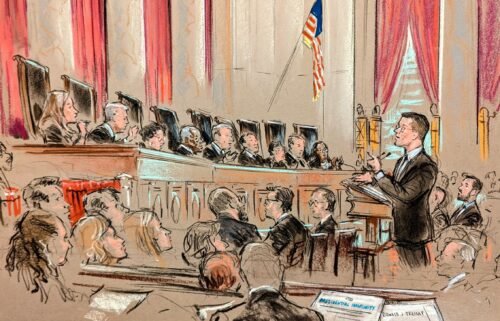Top US diplomat says Giuliani pushed Ukraine to ‘intervene’ in US politics in impeachment transcript

The top US diplomat in Ukraine told House impeachment investigators that President Donald Trump’s personal attorney Rudy Giuliani was pressing Ukraine “to intervene in US domestic policy or politics” by launching investigations into Trump’s political rivals, according to a transcript of Bill Taylor’s deposition released Wednesday.
Taylor told Congress in closed-door testimony last month he saw the requests as so dangerous that he believed Ukrainian President Volodymyr Zelensky should ignore them — even if it meant losing a one-on-one meeting with Trump.
“If President Zelensky, in order to get that meeting (with Trump), were going to have to intervene in U.S. domestic policy or politics … by announcing an investigation on that would benefit someone in the United States, then it’s not — it wasn’t clear to me that that would be worth it,” he said.
Taylor’s testimony corroborates a major allegation from the whistleblower complaint, which said that Giuliani and Trump were trying to solicit help from the Ukrainians to boost his reelection chances in 2020. Giuliani wanted Ukraine to investigate former Vice President Joe Biden and Democratic National Committee servers.
Taylor also testified that it was his “clear understanding” US security aid to Ukraine wouldn’t be released unless the country’s president announced he would investigate Trump’s political rivals. And he said that it was Giuliani, representing Trump’s interests, who was behind what then-national security adviser John Bolton described as a “drug deal.”
“I think the origin of the idea to get President Zelensky to say out loud he’s going to investigate Burisma and the 2016 election, I think the originator, the person who came up with that was Mr. Giuliani,” Taylor said.
Taylor’s testimony is among the most significant for the Democratic impeachment investigation into allegations that $400 million in security aid and a meeting between Trump and Zelensky were conditioned on Ukraine announcing investigations into the 2016 election and Burisma, the Ukrainian energy company that hired former Biden’s son Hunter to serve on its board. In his opening statement, which was published when he testified on October 22, Taylor explained that Sondland told him “everything” Ukraine wanted was conditioned on the investigation. There is no evidence of wrongdoing in Ukraine by either Joe or Hunter Biden.
House Intelligence Chairman Adam Schiff, a California Democrat, announced Wednesday that Taylor would testify next week on Wednesday, the first day that Democrats will hold public impeachment hearings.
Taylor, a career official who remains at his post in Kiev, provided a damning account of how Trump told his appointees to establish a quid pro quo with Ukraine, trading much-needed US military assistance for political favors from Zelensky.
In the wake of his testimony, Trump accused Taylor of being a “Never Trumper.” Trump made this claim even though there is zero public evidence to support his assertion, and available information paints Taylor as a respected and apolitical career diplomat.
In what’s likely a preview of next week’s public hearings, Republicans pressed Taylor on whether he had direct knowledge of the President’s intentions.
“I’ve never talked to the President,” Taylor told GOP Rep. Lee Zeldin of New York.
Republicans also criticized the deposition at the outset of the hearing, in another potential theme for Republicans when the hearings turn public. Rep. Devin Nunes, the top Republican on the House Intelligence Committee, called it a “lawless” proceeding.
Before the questioning began, Texas Republican Rep. Chip Roy interjected with complaints about the process. Schiff told him to take his concerns outside, so they could begin the questioning.
“Take them outside to whom?” Roy said. “You’re the judge and jury sitting in here deciding who can see this clown show. When can my colleagues who aren’t on this committee see the materials in question?”
The situation settled down after some apparent shouting and interruptions from other lawmakers.
‘That would be improper’
In text messages to Sondland that were previously released, Taylor said it would be “crazy” to withhold military aid in exchange for political help from Ukraine, suggesting a potential quid pro quo.
Taylor said Sondland told him repeatedly that Trump did not view the arrangement as a “quid pro quo.” While Taylor would not explicitly say the arrangement was a quid pro quo — “I don’t speak Latin,” he responded at one point to Schiff — Taylor said that the aid was conditioned on the investigations.
“I observed that, in order to move forward on the security assistance, the Ukrainians were told by Ambassador Sondland that they had to pursue these investigations,” he said.
Taylor gave lawmakers new information about how Trump officials pressed Ukraine to launch politically charged investigations. He described a call with Sondland on June 27 where they discussed an upcoming phone call between Trump and Zelensky.
Sondland told Taylor, “President Zelensky, needed to make clear to President Trump that he, President Zelensky, was not standing in the way of investigations,” according to Taylor’s transcript.
Asked for specifics, Taylor said he didn’t know at the time exactly which investigations Sondland was referring to, but that he knew they were related to the probes that Giuliani was seeking. One month after that conversation between Taylor and Sondland, Volker conveyed the message about “investigations” directly to Zelensky on the sidelines of a diplomatic conference in Canada, according to Taylor’s testimony.
Taylor told lawmakers that he did not believe the US should be asking Ukraine to investigate Burisma, because the goal was to influence US elections.
“If the United States were to ask Ukraine to investigate an apparent violation of Ukrainian law, that would be improper,” Taylor said.
Taylor was told multiple times by officials at State and the National Security Council, he testified, that the Secretary of Defense, Secretary of State, the National Security Adviser and CIA director all strongly supported the release of US aid to Ukraine. He added that he was “embarrassed” in conversations with Ukrainian officials when they asked about the stalled US aid, because he didn’t know the reasons behind the freeze.
“I’m a representative of the United States Government out there, and he asked me a perfectly legitimate question, why are you holding up this assistance, and I couldn’t tell him,” Taylor said.
Taylor’s ‘snake pit’
Taylor explained in his testimony his concerns about taking the job in May, when he became the top US diplomat in Ukraine following the ouster of then-Ambassador Marie Yovanovitch, comparing both Washington and Kiev to a “snake pit.”
“I was concerned that there was, I think I put it, a snake pit in Kiev and a snake pit here, and I was not sure that I could usefully serve in that context,” Taylor said.
Taylor said that one element of the “snake pit” in Washington was Giuliani’s efforts to travel to Ukraine and dig up dirt on the Bidens, which already underway and public knowledge when he took over in Ukraine.
To hash out those qualms, Taylor said he spoke with Secretary of State Mike Pompeo and State Department Counselor Ulrich Brechbuhl, where he raised concerns about what was happening to US policy toward Ukraine. He later said he didn’t remember if he mentioned Giuliani by name.
“I let them know up front going into the meeting that I had not decided whether to accept the offer to go back out to Kiev because I was troubled by what I was hearing, not just this Giuliani article, but I was troubled by other things as well and I made this clear to both, both Mr. Brechbuhl and Secretary Pompeo,” Taylor said.
In response, Pompeo told Taylor that he would always support a “strong US Policy” toward Ukraine, and that he would “make this case to President Trump,” according to Taylor’s testimony.
Taylor said he initially “wasn’t disturbed” by Giuliani’s role in steering US policy toward Ukraine, but that his opinion soured as he learned more about the political favors Giuliani was seeking from Ukraine.
Eventually, Taylor once again turned to Pompeo, sending him a cable that was written in the first person to get the secretary’s attention.
“Normally these cables are not first person, they are third person,” Taylor said. “So, it gets attention when it comes in from the ambassador saying, ‘I am concerned.'”
Taylor testified that he was prepared to resign amid the holdup of aid, and he explained in more detail what he meant in text messages describing a “nightmare” for Ukraine that would have prompted his departure.
“‘The nightmare’ is the scenario where President (Volodymyr) Zelensky goes out in public, makes an announcement that he’s going to investigate Burisma and the election in 2016, interference in 2016 election, maybe among other things,” Taylor told the House committees. “The nightmare was he would mention those two, take all the heat from that, get himself in big trouble in this country and probably in his country as well, and the security assistance would not be released. That was the nightmare.”
When US aid to Ukraine was ultimately released on September 11, Taylor said he did not learn about it from the State Department. Instead, a Senate Armed Services Committee aide informed him.
“So I got this email, I think it was probably overnight, which I then sent to (National Security Council official) Tim Morrison and I think maybe to George Kent saying: ‘Oh, this is great news. This is what we’ve been waiting for,'” Taylor said. “And Tim hadn’t heard it yet. So that’s how I first heard. And then he later that day confirmed.”
This story has been updated with additional developments and will be updated Wednesday.




